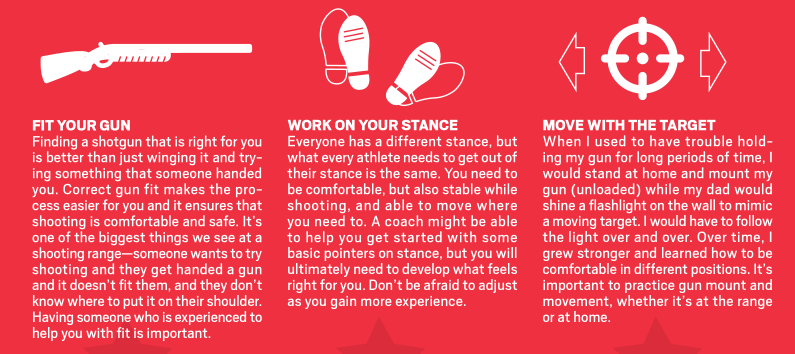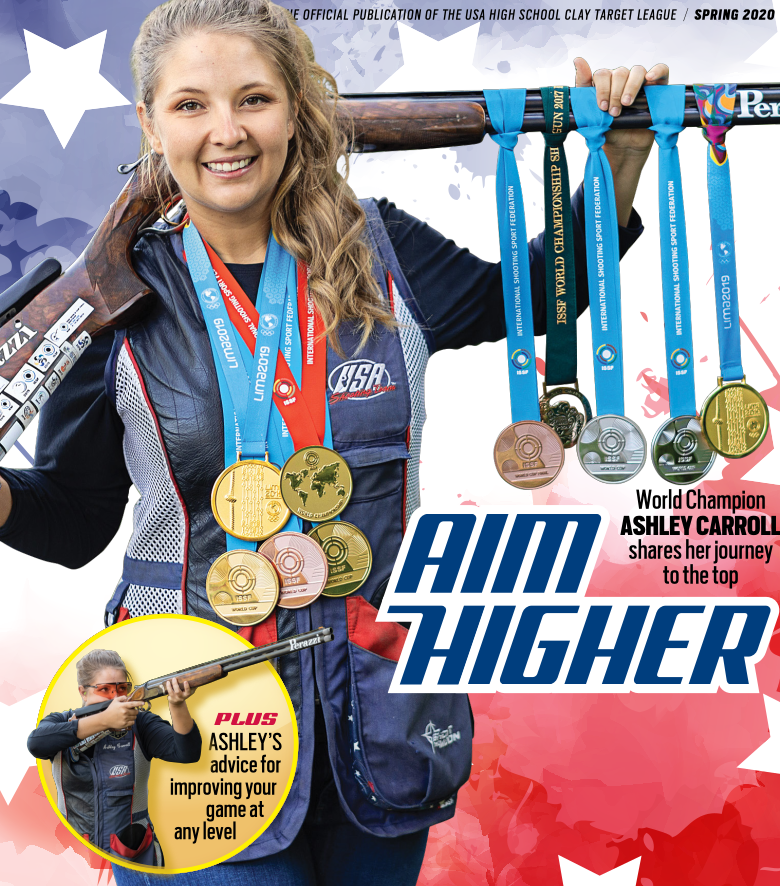
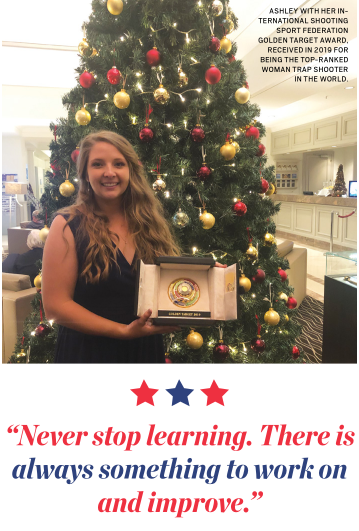
Last July, at the age of 24, Ashley Carroll accomplished what no other U.S. shooter had in 20 years by winning the world women’s trap shooting title. She and her parents traveled to Lonato, Italy, where the world finals were
held, a week early to prepare. She used the extra days to adjust to the time difference, get acclimated to the hot weather, practice on the range, and to make sure she was ready down to the last detail, such as what glasses to wear. The preparation helped her confidence, but when the match began, she was still nervous. The 2019 season was a whirlwind of success for her, and now she was on the cusp of history. Fighting through the nerves, she started strong and rode the momentum through the final round, besting 2018 world silver medalist Wang Xiaojing of China by a single target—hitting 42 of 50 clays. “The big thing that was key to my last round during matches that year was telling myself, hey, you’ve worked this hard coming up to it, you know what to do, you’ve got to trust it,” Ashley says. “You’re creating your own destiny. Go out there and create it. Do what you need to do.” She did it, breaking a championship drought that had lasted since U.S. shooter Cindy Gentry’s world title in 1999. As she moves forward in her young shooting career, Ashley is still eager to improve, and now has her sights set on greater goals.
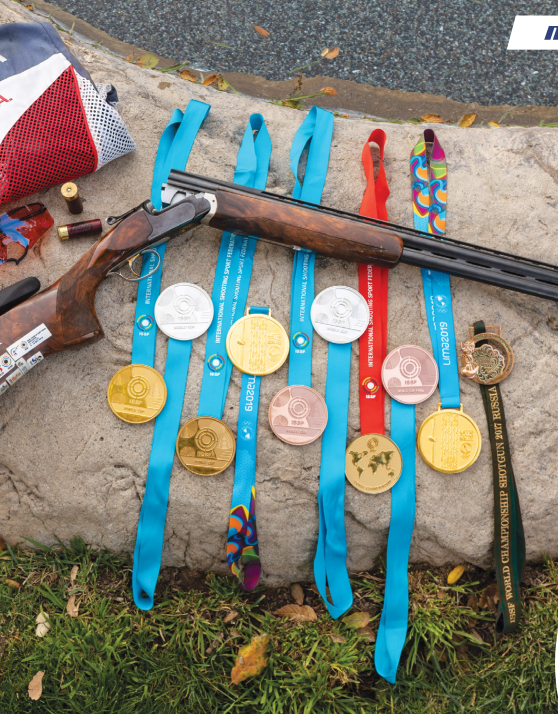
FOLLOWING DAD’S PASSION
Ashley grew up in the small Southern California town of Solvang, in the Santa Ynez Valley. Squint hard and you might think you’re in Denmark, she says—the town’s Danish heritage is its claim to fame, and it’s evident from its architecture to its pastry shops. She always enjoyed spending time outdoors, and as a young girl, she tagged along with her father, Charlie Carroll, to his Wednesday night league trap shoots through the Santa Ynez Valley Sportsmen’s Association. “She took an interest in it and kept asking when she was going to be able to do it,” he says. “I never thought we’d take it as far as we’ve taken it, let’s put it that way, but she’s always had that little bit of a competitive edge and a desire to shoot.” One night Charlie noticed a young boy shooting at the range. After asking how he got started, the Carrolls were invited to check out a youth program that shot every Friday. A week after sitting through an information session and watching the kids shoot, Ashley and her father returned to give it a try. Though she could barely hoist the shotgun, she took a few shots and eventually broke a clay. After that, it was game on, she says. “So from then on, it was pretty much every Friday night that I would go up and shoot with all these different kids from all over the valley, and I got to meet new people and I got to experience new things,” Ashley says. “And ever since then, I’ve been shooting.”
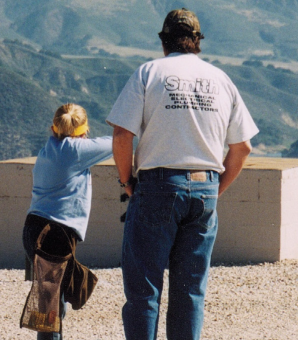
An active student, she also played basketball, soccer, and volleyball in school, but it was trap shooting that she enjoyed most. “I liked that it was totally out of the realm of those other things,” she says. “And you know, I think being in control of what you want to be in control of is what’s kind of cool to me. I had control of how much I wanted to train, what I wanted to work on.” It wasn’t long before that work started paying off in ways she hadn’t imagined.
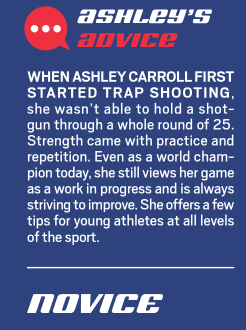
GOING PRO
Charlie is a longtime youth shooting sports coach who has served as his daughter’s primary coach since she fired her first shot. She had been shooting for several years when Charlie was invited to Colorado Springs to take part in USA Shooting’s Olympic coach program. That’s where he was introduced to international (bunker) trap shooting. The challenge presented by five stations, 15 oscillating trap machines and faster clays immediately appealed to Ashley. Even though the nearest range was in Los Angeles, nearly three hours from home, she started practicing every week, and before long, she was competing. “Right from the get go, for her age bracket, she was competitive,” Charlie says. “And the next thing you know, she’s not just beating her age bracket, she’s beating the three classes above her and making it into the top 10 or 20 against adults.”
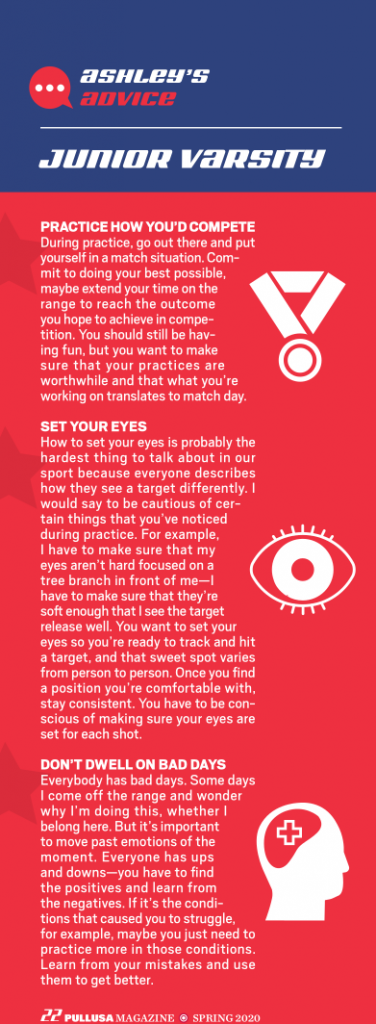
As a teenager, Ashley went to the Junior Olympic trials and missed getting in by just a couple of clays against stiff competition from future U.S. team stars, such as Jake Wallace and Brian Burrows. Inspired by the performance, the father/daughter team decided to take part in its first national shoot, followed by the Junior Olympics. From there, things snowballed. Ashley’s first trip to Lonato, the site of her world championship win, was in 2010 with the World Cup team. “And I think being able to experience going overseas is what kind of turned me on to the idea of shooting full time,” she says. “I thought, my gosh, this is cool, this is something I can do. I can see the world and I can do it while shooting. It’s
something that you wouldn’t think you’d be able to do in reality.” Like all students, Ashley had some big decisions to make before high school
graduation in 2013. As one of the nation’s top athletes, she was invited to train for free at the U.S. Olympic Training Center in Colorado Springs. Still, it took a lot of soul searching and conversations with her parents to make a decision. An earlier talk with five-time Olympic medalist Kim Rhode (a previous PullUSA cover subject) also served up some inspiration.
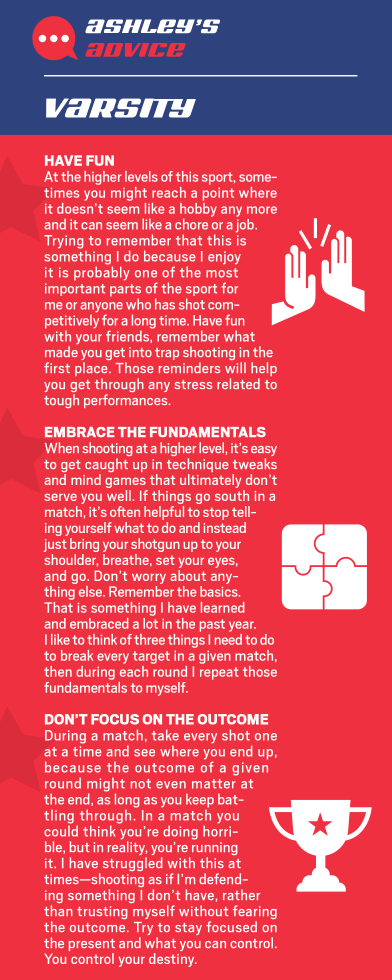
She opted to commit to shooting while also taking classes part-time through
Pikes Peak Community College. “What did I want to do with my life? I didn’t even know what I liked, or how to be an adult. I still kind of don’t sometimes,” Ashley laughs. “I decided to take the chance to go put my heart and soul into shooting and to try to make the Olympic team.”
CHASING A DREAM
The next chapter of Ashley’s journey started precariously, when her gun was lost on the team’s World Cup trip to Granada, Italy. Practicing with teammates’ guns between long trips to the airport. The gun arrived in time for her to get in two practice rounds with it before competition. Despite the drama, Ashley made her first open seat final at the event, finishing fifth. Dealing with challenges—whether it’s baggage issues, harsh weather
conditions, or other stresses—has helped make Ashley a stronger shooter. She’s used to packing everything from heavy coats to rain paints for a single trip, so she’s prepared for anything. “We’ve been to matches where it’s been 80 degrees on practice days and 27 degrees on match day,” she says. Her list of accolades since that 2013 World Cup is long. It includes three straight national titles between 2015 and 2017, and World Cup gold medals in 2017
and 2018. She’s also had success shooting on a mixed team with Staff Sgt. Derek Haldeman (also a past PullUSA cover subject). Ashley now lives with Haldeman in Alabama and practices most of the year with him and the rest of the U.S. Army Marksmanship Unit in Alabama. “Even though this place is hard and challenging, I get to train with some of the top athletes in this area, and it’s really nice to be able to train with people who work just as hard as you and who you can bounce ideas off of,” Ashley says. “There’s
a huge support network here.”

After her stunning 2019 season, Ashley narrowly missed a shot to compete on the 2021 Olympic Team, but she will serve as an alternate. At 25, she still has many years to reach her goal, and plans to continue working toward achieving her dream of Olympic competition. As for being a world champion, Ashley is humble about the achievement, though she recognizes she’s now a part of history. Still, that’s not what stands out in her memory of the event. “All I can remember is my mom in the background screaming,” she says. “You always know your parent’s voice.”
A LIFETIME SPORT
Ashley says participating in shooting sports at a young age helped shape who she is today. It taught her responsibility, got her out of the house, and allowed her to meet many new people. She’s encouraged by the growth of the League, both at the high school and college levels. “There’s a great opportunity now for kids to be able to go to school and participate in a shooting program,” she says. “It’s something I don’t ever regret getting into because I’ve learned a lot about myself as a person, and I’ve been able to
see the world doing it.”
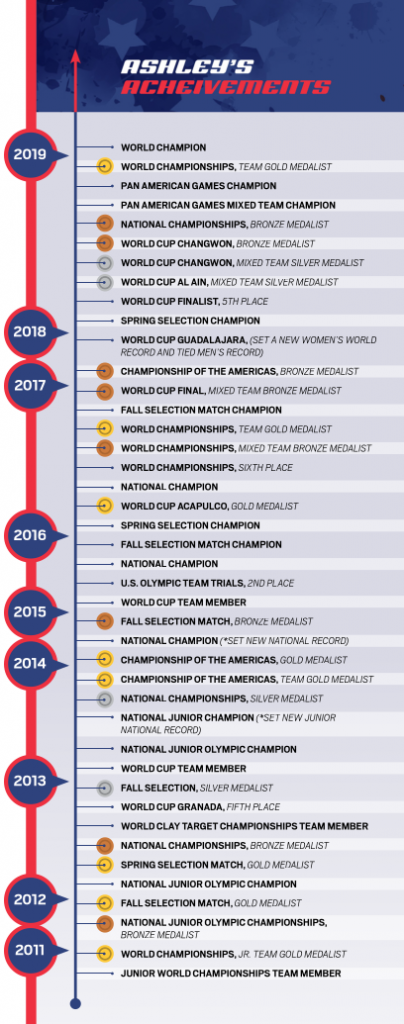
She said the growth of shooting sports is also encouraging because of the opportunities it provides students who might not be interested in or able to compete in traditional sports. “Shooting doesn’t limit anyone. You can do it in a wheelchair,” Ashley says. “As long as you’re safe, you can be any shape or size. You can learn to shoot for the fun of it and as a way to be around other people. And you can be any age. You can be me at 8 years old, or you can be 40. Anyone can do it and you can do it for a lifetime.”
